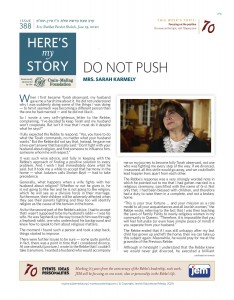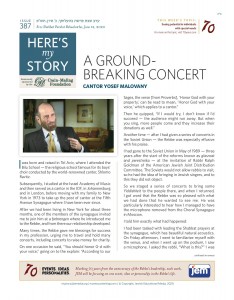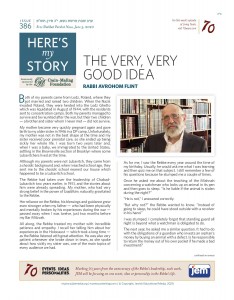Do Not Push
When I first became Torah observant, my husband gave me a hard time about it. He did not understand why I was suddenly doing some of the things I was doing – to him it seemed I was becoming a different person than the one he had married – and he did not like it.
So I wrote a very self-righteous letter to the Rebbe, complaining, “I’ve decided to keep Torah and my husband won’t cooperate. But isn’t it true that I must do it despite what he says?”
I fully expected the Rebbe to respond, “Yes, you have to do what the Torah commands, no matter what your husband wants.” But the Rebbe did not say that. Instead, he gave me a two-part answer that basically said: “Don’t fight with your husband about religion, and find someone to influence him, someone whom he will respect.”
It was such wise advice, and fully in keeping with the Rebbe’s approach of finding a positive solution to every problem. And I wish I had immediately done what he said, but it took me a while to accept that harmony in the home – what Judaism calls Shalom Bayit – had to take precedence.
Generally, what happens when a wife fights with her husband about religion? Whether or not he gives in, he is not going to like her and he is not going to like religion, which he will see as a divisive force in their marriage. Furthermore, their children will be adversely affected when they see their parents fighting and they too will identify religion as the cause of the tension in the home.
As for the second part of the Rebbe’s advice, I had to accept that I wasn’t supposed to be my husband’s rabbi – I was his wife. He was Sephardi so the way to reach him was through a Sephardi rabbi, one who understood his background and knew how to speak to him about religious matters.
The moment I found such a person and took a step back, things started to improve.
There were further issues to be sure – some quite painful. In fact, there was a point in time that I considered divorce. At one stressful juncture, I wrote to the Rebbe that I couldn’t take it anymore. I wanted a husband who would accompany me on my journey to become fully Torah observant, not one who was fighting me every step of the way. If we divorced, I reasoned, all this strife would go away, and we could both lead happier lives apart from each other. (more…)







